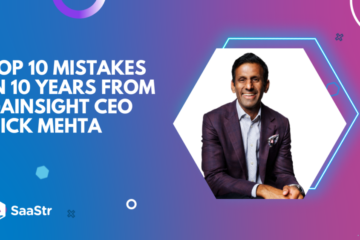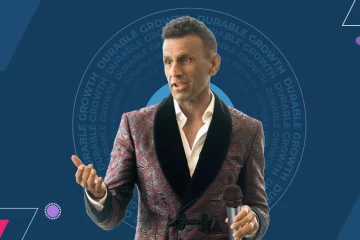Scaling a SaaS Company in a Competitive Space: Gainsight CEO Nick Mehta

Sramana: Nick, let’s start this story by getting your personal story. Where do you come from? What is the genesis of your entrepreneurial career?
Nick Mehta: I was born in Massachusetts but spent most of my childhood in Pittsburgh, Pennsylvania. I went to school at Harvard and came out to California after college. I have been living in the Bay Area for around 15 years now.
My parents are from India. My father moved here to work for Digital Equipment when it was going through its heyday in the 1970s. He became a CEO of a number of tech companies and startups. I was thrown into tech startups from the time I was a little kid. I got my first PC when I was six years old, and I was programming at some point after that. That background motivated me to move to California and chase this dream.
Sramana: When did you graduate from Harvard?
Nick Mehta: I was born in 1977. I graduated from high school in 1994 and graduated from Harvard in 1998. I did a bachelor’s and a masters as a combined degree, with a bachelor’s in biochemistry and a master’s in computer science.
In college, one of my computer science classmates started an Internet company called ChipShot.com, which was one of the first online retailers of golf equipment. I decided to move to California after college to run the business full time. I got caught up in the late 1990s dot-com fun.
Sramana: Did you get to the Valley while the bubble was at full strength?
Nick Mehta: Yes. I was here for part of the fun, and then I was here for the crash. I moved to here to run the website full time and lived in my co-founders parents’ house in Saratoga. We worked out of their garage. We raised venture capital from Sequoia and did a number of rounds after that. We grew the company to 250 people and did $30 million in sales. We were on the path to go public but missed the IPO window before the crash.
Sramana: You started that company in college. What drove you to start an Internet retail site as a college student?
Nick Mehta: There were four of us who started the company. Three of us went to Harvard together, and two of the founders were on the Harvard golf team. I always wanted to help create a technology business. We all approached the business from a different perspective. We were classmates in a computer science class. Back then, building an e-commerce site was a lot more raw. We figured it out and built a business selling golf clubs online. In 1996 and 1997 we would get one order a month. It then became one order a week. By the time we graduated in 1998, we were doing $50,000 a month in sales.
Sramana: I think it is great that you not only started the company while you were in College but that you were earning revenue as well. At that time it was very rare for an Internet company to actually have revenue.
Nick Mehta: That was a crazy time as you know well. In June of 1998 we all had a big decision to make. We were all on the traditional college to job path. One of the co-founders had a job lined up at McKinsey and I was ready to go work in technology investment banking for Credit Suisse First Boston. We came up with a grand plan to work on our website through the summer and then sell it for $100,000 before heading off to start our jobs. We felt that starting off with $25,000 dollars a piece was a great way to get our professional careers going.
Then the summer of 1998 hit. Our business started to scale and ecommerce started heating up. We ended up raising a venture round from Sequoia. We brought in a CEO and a professional management team. We saw the good and bad of the dot com bubble.
Sramana: What was the outcome of that company and your role in it?
Nick Mehta: We ran out of money as we were making our push for the IPO. The market fell out before we had our IPO and we needed venture money to survive. It was very hard for Internet companies to raise money at that time so the company folded. We ended up selling the assets at the end of 2000. I left right before the very end in September of 2000. It was not a fun way to end it but it was an amazing experience.
Sramana: I was an entrepreneur during that timeframe as well. I started my first company in 1995 when I was at MIT in graduate school. I did three startups until the bubble burst. It was an amazingly compressed experience. It is very hard to assimilate as much education in any other fashion.
Nick Mehta: That is a great way to say it. People always ask what I learned from that. One key lesson for me was to carry confidence in yourself. Back then there was a playbook for doing startups. You would raise a lot of money and then hire experienced people thinking they had the answers. The reality is that nobody had the answers for those markets. If anything I think we could have trusted our own judgment more and that is something that has been useful for the rest of my career.
Sramana: What happened next?
Nick Mehta: I briefly went to another startup called XDegrees. It was a very early stage company that had technology conceptually similar to DropBox, just a decade earlier. It was started by some Stanford PhD graduates who had interesting ideas about building file sharing technologies. RedPoint funded the company and I was introduced to the founders through RedPoint and I came in to run Product Management. That was my first real job. The company was acquired by Microsoft in 2002.
Sramana: What came after your exit from RedPoint?
Nick Mehta: In 2002 I was talking about my career options with a VC. We were talking about big companies, and he told me that if I ever wanted to go work for a big company to get that experience, I should do it at that point because it would be a lot harder to do it later. He told me that I would learn a lot about how things work at scale.
I then went to Veritas, which was a storage company that was pretty hot at the time. They were growing pretty fast. I found a product management job listed on the website and called. I was able to get an entry-level product manager job working for a very boring product. I was excited about the job, though, because I felt it was an opportunity to see how to sell technology at scale and how to build a large product.
I came in as a product manager in 2002. I spent five years at that company, during which time Symantec bought Veritas. I was fortunate and lucky to work on something that did well. I ended up becoming a VP and general manager of a business that grew from $20 million in revenue to $300 million in revenue in a couple of years. I was fortunate to be on that team because we essentially ran a mini business unit within the company. It was a great learning experience. In 2007, after five years at Veritas and Symantec, I felt I had learned enough about large enterprise, and I decided to go back into the startup world.
Sramana: How did that decision come about?
Nick Mehta: I was at a large company and learned a lot. I think there is an opportunity to learn everywhere, and I enjoyed my time there. At some point I felt that some of the learning I was looking for was not coming anymore. There was one day in 2007 when I slept through my alarm clock, and my wife thought that was really odd; it was something that I had never done before. I was running a global business unit, so I was used to waking up at 5 a.m.
She knew that I was having thoughts about doing something different. I don’t know if it was the universe telling me to do something different, but it made me realized that I was probably not as excited about what I was doing as I used to me. I find it hard to do something if I’m not excited about it.
I knew that I wanted to run a company, but I did not know what it was that I wanted to start. I thought about a lot of alternatives, such as starting something on my own versus going into an existing startup as an executive. I knew some folks in the VC industry, and a few different firms asked me to come spend some time with then as an entrepreneur in residence until I figured out what I wanted to do next. I would describe that as a job that only exists in California, where a VC pays you money to figure out what you want to do with your life!
Sramana: Which firm did you join as an EIR?
Nick Mehta: I joined Trinity Ventures at the end of 2007. That was great because it got me to step away from the singular vision of running a large business unit and opened my eyes to the entire world again. I was meeting with young entrepreneurs and was able to explore my options. I thought about starting my own company, joining another company as an executive, or partnering with someone else.
I remember meeting Drew Houston when it was just him and his cofounder in a little conference room. I met several other individuals who went on to be incredibly successful. In the process I ended up looking at a number of different opportunities to join companies and run them. One of the companies was LiveOffice, which was funded by Summit Partners. I ended up joining them as the CEO in May 2008.
Sramana: That’s interesting. I typically see EIRs spin out their own companies but you ended up taking a different route and joining a portfolio company.
Nick Mehta: It is interesting because that happens a lot. The probabilities that you will find up with a company in the VC portfolio is not 100%.
Sramana: Trinity is a very good firm. I have some close friends there. What were the compelling aspects that made you take the position with LiveOffice?
Nick Mehta: Summit Partners is a growth equity firm. They invest in companies that are already profitable and starting to scale. LiveOffice was interesting because their core business was hosting email. When Google and Microsoft got into that business, the email hosting business went away. LiveOffice needed to pivot its assets into something new.
We sold the old businesses and created a whole new company from scratch. Our business morphed into using the cloud to help businesses store and search data for legal purposes. It is called e-discovery. We became the leader in that category. We grew that company to $25 million in revenue. I ran that company for four years and had a lot of fun. That was my first time running a cloud-based business, and I will probably stick with those types of businesses for the rest of my career now.
We sold the company in January 2012 when we sold the company to Symantec. They bought us for $150 million, which was a great exit. It was a perfect fit for what we did and that was the right channel for scaling the business to the next level.
Sramana: How did Gainsight come into your life?
Nick Mehta: In a way it found me. While I was at LiveOffice I learned a lot of new things. I learned that when you have subscription pricing models, you can’t just focus on getting new customers. All of the post-sale activity has traditionally been a cost center. If you are in a cloud or SaaS company, you have to keep your customers every year. At LiveOffice we had a good renewal rate, but I knew it could be better. We invested a lot of time and money to analyze which customers were really using our service and which were at a high risk of leaving.
After I left LiveOffice, I became an EIR at Accel Partners and then Battery Ventures called me. They had just invested in a company that was building technology to help SaaS companies reduce churn. It was the exact problem I had at my last company. When I met the founder, it was obvious that we aligned culturally and held the same values.
Sramana: What is the background of the founder of Gainsight?
Nick Mehta: He was running another SaaS company called Host Analytics, a SaaS-based corporate performance management product. It is a sizable business with a lot of customers. He brought in a CEO and became the chief customer officer of Host Analytics. His job was to ensure customers continually renewed their subscriptions and bought new services. He realized there were a lot of technologies to get customers to purchase a product, but there was no technology to help him understand his existing customers in terms of what they were using, how satisfied they were, and whether there was a risk level in their leaving.
He founded Gainsight to solve that problem. He wanted to build a technology that was the equivalent of what marketing and sales had that could be used for customer retention. That was the original genesis. He built this as a side project while he was at Host Analytics, and then he bootstrapped the company and ran it very lean for a couple of years.
Battery Ventures heard about Gainsight from some of their portfolio companies. Battery reached out to Gainsight and offered to invest. They struck a deal in February of this year. Battery Ventures introduced me to Gainsight. The first round was $6 million, and a month ago we did a $20 million Series B round led by Bain Capital Ventures.
Sramana: How much traction did Gainsight have when you joined?
Nick Mehta: We had a great product and a small handful of customers. We had 35 customers with some really good brand names, such as Marketo and Informatica. Over the last six months we have launched the company from a marketing standpoint. We were originally called JBara software, and we rebranded as Gainsight in April. When I joined we had a dozen people, almost all of them in engineering. Now we have 65 people. We have built our teams in marketing and sales. We just opened our first office.
Sramana: How did you build the scaling infrastructure for Gainsight? What decisions did you make to enable a successful build-out?
Nick Mehta: My favorite aspect of being a CEO is creating an environment that makes people love their jobs. The first thing we do to scale is define our values and culture. We have been fortunate enough to really grow that. We have three values. The first is the Golden Rule [do unto others as you would have them do unto you]. The second is Success for All. We are trying to build a business where everyone wins. We want to make sure our customers, employees and shareholders all win. Our third value is Childlike Joy. How can we make work not have to be a thing you do be able to have a fun part of your life? We look to find ways to make work and home life become seamless. Our culture has been a key to our success so far.
The next step was to build the team. We were fortunate to bring in a great leader for our marketing team. He was someone I worked with at LiveOffice. I already had my chief customer officers, and Jim Eberlin who founded the company works as the president. Our head of product management is also someone I have worked with in the past.
When it comes to scaling sales and marketing, I think there are several different ways to do it. It depends on the marketing you are in as well as the profile of the customer you are going after. The deal size is important to consider. For us there were a few unique facts. This was a brand new category. We had to go out and evangelize why customers should use us. We decided to go big on thought leadership marketing right up front. We ran a conference about customer success which was a hot topic. We made some heavy bets on content marketing. We have to not only teach people about our technology, but about the category itself.
Sramana: Thought leadership marketing is very expensive. When you are building a category, it takes time to build a market. It’s helpful to have competitors because you are no longer the only company investing in leadership marketing. Have competitors to Gainsight emerged?
Nick Mehta: Yes, they have, and you are 100% right. I like having competitors because customers have comparison points. It legitimizes the space we have worked so hard to build. We were able to get ahead of the rest of the market in terms of defining the category but we did not build the category alone.
There are some products where the demand is latent. People know they need something and it is about finding those potential customers and developing a method to get sales volume targeting those customers. However, if the category is nascent it is more about understanding customer need and mapping your capabilities to their needs. We are in the latter category. We had to hire salespeople who are really good listeners. We had to develop a sales process that addressed the various concerns someone would have in the buying process. We had to build content to support that sales model and we are still building out our sales methodology.
We find that we sell to startups that have just a few million in revenue and we sell to established companies with billions in revenue. We had to think about what our model really looks like. We have an inside and an outside sales team. We are still figuring it out.
Sramana: It would seem like you require consultative selling even on the inside.
Nick Mehta: Consultative selling at small price points does not scale. In the early days we just wanted to get some customers, so we did not care about that. At small companies, if you do a good job of teaching them how to do things, they will be good to follow best practices. A lot of smaller companies are looking to us to tell them how to do these things because we are working with so many other companies that are telling them how to do things. Our inside deals have become more predictable and streamlined. Outside deals are focused on larger companies and it is a much more complicated sales strategy.
Sramana: What is the breakdown between large companies and smaller companies?
Nick Mehta: One person’s large customer is small to someone else. Right now I would say it is a mix between customers paying us five-figure deals which are sold through our inside sales team. Our outside sales team focuses on six-figure annual deals. The sales plans for the next few quarters looks to be roughly even between inside and outside deals.
Sramana: What is your sense of the real comparative dynamics? When you look at your competition, what really threatens you?
Nick Mehta: There are different answers depending on your time horizon. We have direct competitors which are also very solid startups. I think each company will have a different background. I think that is important. All of us here at Gainsight came from companies that ran subscription businesses, and we all dealt with this. We have all lived this problem first hand, and we designed the product to address what we lived through. We know we are not going to win every deal. However, we must win the deals that we are a good fit for.
Customers purchase you not just for your product, but for your prospective and vision. All companies in our category will change dramatically in the next five years. We have a vision and we need to make sure people believe that our vision will align with their needs.
Sramana: There are larger companies such as Oracle who have internal projects to address the same market you are going after. Of course they have a lot more market reach than a startup. How do you position Gainsight knowing you have those types of companies getting involved?
Nick Mehta: We have to focus on our strengths. There are some upsides to being in a startup. We have to leverage our ability to be nimble and innovative. We are also more likely to have customers who are not in the sweet spot of an Oracle or an SAP. I also believe SaaS is changing the dynamic of what used to happen in software, specifically around consolidation. SaaS has made it very easy for business units to buy software themselves. They can do integration in the cloud. SaaS can support a much more diverse set of vendors.
Sramana: How long is your sales cycle.
Nick Mehta: Our inside sales deals typically take 6 weeks. Our outside sales take around 3 months. The bigger the deal size the longer it is going to take. Sales cycles are shortening in general because vendors like us let people take software and try it out. Deployment is very easy as well.
Sramana: What metrics do you try to get prospective clients to zero in on during their trial period?
Nick Mehta: We have several phases of evaluations. A lot of our customers just buy after a demo. Others do a customized demo where we load their datasets into our product to give their demo a real operational feel. When they are doing a trial they are evaluating the technical functionality and determine if it fits into their workflow. We have a predictive analytics model that tries to predict at-risk customers. We can provide that to prospective clients as well.
Sramana: It would seem that you do need a level of integration. For example, you would probably want to integrate with the email marketing system and website logs. What are your capabilities there and how does that factor into the sales process?
Nick Mehta: Most of our customers start with what is in their CRM system, such as SalesForce, and we do those integrations easily. The next step is usually integrating with their online product database. They will then add in other integration points down the road.
Sramana: You have come in as an outside CEO and replaced a founder on multiple occasions. What have you learned in that process?
Nick Mehta: I have been on both sides of that coin. When you come into a company you have to get lucky to get welcoming founders. I have been very fortunate there. You need to have a lot of respect for what the founders have already done, and they have to respect that there is a lot of work required to get to the next level.
One thing that I feel is very important is accountability. Often times you will see new leaders come in and blame problems on the prior leadership. I have always taken the view that the leadership before me created the opportunity that I am sitting in. It is hard to get something from zero to something. I personally enjoy growing companies. I have tremendous respect for people who take a company from zero to something small. I also think the market respects companies that still have a founder on the team.
Sramana: I think the industry has reconciled itself and does value first time CEOs and founders. They bring a lot of passion to the company and its sad if a company can’t harness that power.
Nick Mehta: There are also a lot of resources for first time founders now. In the late 1990s everything was a black art. It was hard to get that knowledge. Now there are a lot of resources out there.
Sramana: Nick, thanks for taking the time to talk. I look forward to following your continued success.



